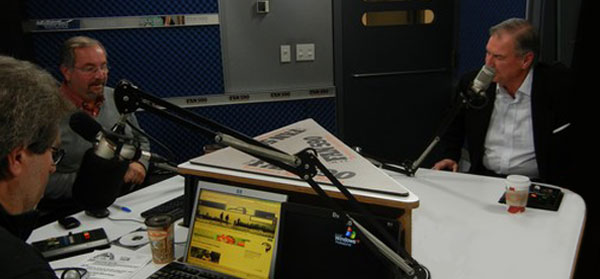

The winds of change are blowing through Canadian sports media, and based on conversations during my recent visit to Toronto, they’re reaching gale force.
Industry insiders indicate Bell Media could be actively exploring the sale of TSN and its affiliated properties. This isn’t just idle speculation – it’s part of what many consider to be a a larger strategic shift at Bell, which has already announced plans to divest its MLSE shares. The company’s priorities became even clearer with Bell Canada’s $3.6 billion acquisition of Ziply Fiber, a Pacific Northwest broadband provider serving Washington, Oregon, Idaho and Montana. The message is clear: Bell is pivoting away from media content toward core telecommunications infrastructure.
The timing of these moves – a major U.S. fiber network acquisition, the MLSE share sale, and now a potential TSN divestiture – paints a picture of a company methodically exiting the volatile sports media business in favor of more stable infrastructure investments. While Bell plans to expand Ziply’s reach to more than three million locations in the next four years, it appears to be simultaneously planning its exit from sports media properties.
While no potential buyers have been publicly identified for TSN, several factors make this move logical. TSN, despite its strong brand recognition, faces increasing challenges in the current media landscape. Rights fees continue to escalate while traditional subscription revenues decline. The NHL national rights loss to Rogers in 2013 marked a significant shift, and while TSN has maintained regional rights and other properties, the economics of sports broadcasting have fundamentally changed.
This potential sale could reshape the entire Canadian sports media landscape, particularly as streaming services increasingly compete for sports rights. TSN’s current portfolio, including CFL, FIFA, and regional NHL rights, could be attractive to multiple buyers, including streaming platforms looking to expand their live sports offerings.
Meanwhile, at Rogers Media, The FAN 590’s future appears increasingly precarious. Sources suggest the station, once the flagship of Canadian sports radio, could be shuttered in favor of an all-podcast format. The transformation is already evident – programming has been significantly cut, with only “The Real Kyper Show” generating meaningful audience numbers. The station, which pioneered sports radio in Canada, now relies heavily on Blue Jays, Raptors and Leafs games to maintain relevance.
Numbered are the days where one really needs a traditional radio to consume audio content of any kind, let alone sports talk or even games. On a recent drive from Detroit to Columbus, I was able to listen to a University of Colorado Buffalo’s football game entirely utilizing digital technology in my car radio (not a tesla) with zero technical issues save for a minor delay (which was less than my HNIC delay on a typical Saturday night here in Seattle via the CBC to Comcast feed).
Industry observers note that Rogers has systematically reduced investment in The FAN, cutting both personnel and programming budgets. The current lineup bears little resemblance to the station’s heyday when it dominated sports discussion in Canada’s largest market. With radio advertising revenues declining and production costs remaining high, the move to an all-podcast format could be seen as inevitable rather than surprising.
The podcast landscape continues to evolve as well. Bob McCown, arguably Canada’s most influential sports media personality, announced last week on Facebook the end of his podcast after more than 1,000 episodes, stating simply, “I regret to inform you that ‘The Bob McCown Podcast’ will not continue in the foreseeable future.” While teasing “another project which will garner my attention,” McCown’s exit from podcasting, following his departure from traditional radio, marks another significant shift in Canadian sports media. This news, coupled with the announcement of a new hockey-focused podcast from industry veterans John Shannon and Darren Millard, suggests a continued fragmentation of sports content – moving from general sports coverage to more specialized, focused content streams.
The sad part about McCown’s departure is that the podcast format was perfect for Bob. He no longer had any of the limitations of traditional radio to contend with. No traffic updates, no commercial breaks and no subjects he really didn’t want to take. No calls, no guests he wasn’t REALLY interested in. I will say it again, no one conducts an interview like McCown, and that is especially true when Bob is engaged in the subject. If this is indeed the end, well, will need to write a real thank you, wont’ we.
Let’s just say this about McCown and his PTS show. Bob was the Nightline of sports. On either the day an event happened or the day after, McCown was guaranteed to have the newsmakers on his show and was must listen to talk. From ALi to Ziegler and everyone notable inbetween McCown and the PTS team were the best.
This transformation comes as Amazon’s NHL streaming numbers paint an interesting picture. Recent data shows Toronto-focused games dominating viewership:
Maple Leafs/Blackhawks- Biggest of all close to 1,000,000
Maple Leafs/Winnipeg: 770K
Tampa Bay/Maple Leafs: 730K
Edmonton/Montreal: 445K
New Jersey/Edmonton: 245K
Pittsburgh/Montreal: 220K
These numbers reinforce Toronto’s market dominance, consistently doubling other Canadian matchups. This viewership concentration might explain why traditional broadcasters are reconsidering their strategies and investments in sports media.
The question remains: Are we witnessing the end of traditional sports media in Canada, or just its evolution? As always, stay tuned to this space for updates.

The radio business has always been like this though.
It can be a great job, but when it’s over, it’s over.
A format changes, and out the door goes the previous staff/djs or a radio station is sold. New owner wants to go all new, fires everyone and starts over fresh and new. That’s the biz. Want job security? Don’t work in radio!